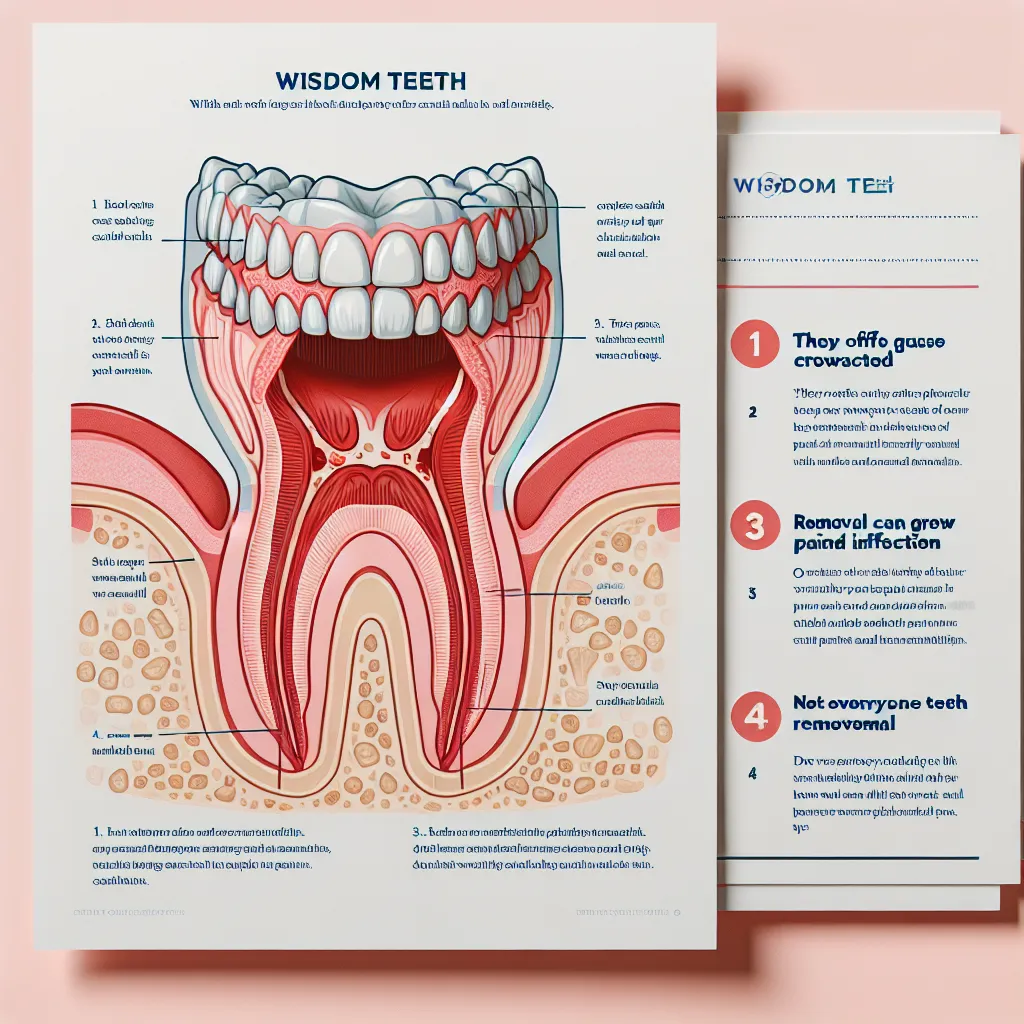
Understanding the Importance of Wisdom Teeth Removal
Wisdom teeth, also known as third molars, can often cause discomfort and issues if not properly managed. Understanding the indications for removal, potential complications, and factors influencing the necessity of extraction is crucial for maintaining oral health. This article explores the key aspects surrounding the decision to undergo wisdom teeth removal.
Signs and Symptoms Indicating the Need for Wisdom Teeth Removal
Have you been experiencing persistent discomfort at the back of your mouth, making it challenging to chew or swallow properly? This could be a sign that your wisdom teeth are causing issues and may need to be removed.
1. Persistent Pain and Discomfort
One of the most common indicators that it’s time to consider wisdom teeth removal is persistent pain and discomfort. This can range from a dull ache to sharp, intense pain that radiates through your jaw.
2. Swelling and Tenderness
If you notice swelling and tenderness in the back of your mouth, especially around the wisdom teeth area, it could be a sign of infection or impaction. This may require removal to alleviate the discomfort and prevent further complications.
3. Difficulty Opening Your Mouth
Struggling to fully open your mouth or experiencing stiffness in the jaw can be a result of wisdom teeth pushing against other teeth or causing inflammation in the surrounding tissues. In such cases, extraction might be necessary to restore proper jaw function.
4. Sinus Problems
Surprisingly, issues with your wisdom teeth can sometimes manifest as sinus pain, pressure, or congestion. This occurs when the roots of the upper wisdom teeth grow near the sinuses, leading to discomfort that can be relieved through extraction.
5. Gum Inflammation and Bleeding
Inflamed, tender gums that bleed easily, especially around the back molars, are potential signs of wisdom teeth problems. Ignoring these symptoms can result in gum disease and further complications that may necessitate removal.
Complications That Can Arise If Wisdom Teeth Are Not Removed
When it comes to wisdom teeth, procrastination can lead to serious consequences. These third molars, often a source of trouble due to their late arrival and lack of space, can cause a host of complications if left unattended. Let’s delve into the potential issues that may arise if wisdom teeth removal is postponed or neglected.
1. Impaction
Wisdom teeth are notorious for their tendency to become impacted, trapped beneath the gum line. This can result in pain, swelling, and infection. Without timely removal, impacted wisdom teeth can lead to further dental problems and compromise overall oral health.
2. Crowding
As the last set of teeth to emerge, wisdom teeth often face a crowded dental landscape. Their arrival can disrupt the alignment of existing teeth, causing crowding and misalignment. Failure to remove these teeth can exacerbate overcrowding issues, leading to bite problems and difficulty in maintaining proper oral hygiene.
3. Infection
The location of wisdom teeth at the back of the mouth makes them more susceptible to infection. When these teeth partially erupt or remain trapped, they create pockets where bacteria can thrive, resulting in painful infections known as pericoronitis. If not addressed promptly, such infections can spread to surrounding tissues and even enter the bloodstream, posing serious health risks.
4. Cyst Formation
Unremoved wisdom teeth can also trigger the development of cysts around the impacted area. These fluid-filled sacs can damage the roots of nearby teeth, bone, and nerves. If left untreated, cysts can grow larger, causing bone destruction and potential complications for future dental procedures.
5. Damage to Adjacent Teeth
Impacted wisdom teeth can exert pressure on adjacent teeth, leading to structural damage and increased risk of decay. The constant pushing and crowding can result in the misalignment of neighboring teeth, affecting their long-term health and stability. Failure to address this issue promptly can result in costly restorative dental work.
Factors Considered in Determining the Necessity of Wisdom Teeth Removal
Wisdom teeth, also known as third molars, are the last set of teeth to emerge in the back of the mouth. While these teeth can be valuable assets if healthy and properly aligned, they often pose problems that require their removal. Several factors are taken into account when determining the necessity of wisdom teeth removal.
1. Tooth Impaction
One of the primary reasons for wisdom teeth removal is impaction. When there is not enough space for the wisdom teeth to emerge or they grow in at an angle, impaction occurs. This can lead to pain, infection, and damage to surrounding teeth, making extraction necessary.
2. Crowding in the Mouth
Another consideration is the impact of wisdom teeth on the overall alignment of the teeth. If the jaw does not have sufficient space for the wisdom teeth to erupt, they can cause overcrowding and shifting of other teeth. Removing them can prevent future orthodontic issues.
3. Infection and Gum Disease
When wisdom teeth partially emerge through the gum, they create an opening that can easily trap food particles and bacteria, leading to infection and gum disease. Removing these teeth can prevent these oral health problems from arising.
4. Cyst Development
In some cases, a fluid-filled cyst can form around an impacted wisdom tooth, causing damage to the jawbone, teeth, and nerves. By removing the wisdom tooth promptly, the risk of cyst development and associated complications can be minimized.
5. Tooth Decay and Cavities
Due to their location at the back of the mouth and difficulty in cleaning, wisdom teeth are more prone to decay and cavities. If regular check-ups reveal extensive decay, extraction may be the best course of action to preserve oral health.
6. Pain and Discomfort
Wisdom teeth can cause significant pain and discomfort, especially when they become impacted or infected. Removing these problematic teeth can alleviate pain and improve overall oral health and well-being.